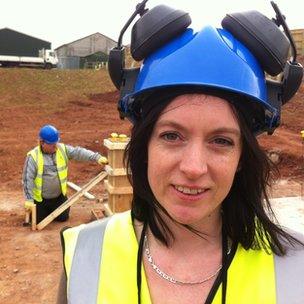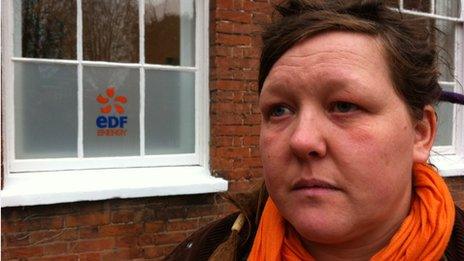Hinkley Point: Nuclear new build could boost economy
- Published
John Moylan visited the proposed new site and went inside the existing Hinkley B nuclear power station
Planning permission is expected to be given this week for French firm EDF Energy to build a new nuclear power plant at Hinkley Point, Somerset, the first new nuclear facility for decades.
Bridie Mongford has Hinkley Point in her sight. She is in her early 30s and lives just three miles away from the nuclear plant.
"I'm a single mother," she says.
"My son has gone back to school, so instead of just getting a normal job in Tesco or Asda I've decided to get a career and I've decided I'm going to try construction."
Ms Mongford knows that there is the prospect of a decade-long major building project on her doorstep.

Bridie Mongford hopes to get work if a new power plant is built
"I'm hoping for a long-term career in construction and hopefully to get a job out at Hinkley Point," she says.
On Tuesday, the government is expected to approve planning permission for EDF Energy to build the first new nuclear power plant for a generation.
Hinkley C would be one of the UK's biggest infrastructure projects in years. The plan is to build two reactors, which together would generate 3.2GW of electricity. That's 7% of the UK's electricity, and enough to power five million homes.
It would be the third nuclear plant at the site. Hinkley A began generating in 1965 and was closed down in 1999. It's now being decommissioned.
Hinkley B started generating in 1976, and currently provides 880MW of power. But it's due to be turned off in 2023.
Investing in skills
Ms Mongford is one of 16 students being trained at a new Construction Skills Centre.
"Six months ago, we didn't have this kind of activity as a local college," says Andy Berry, vice-principal of Bridgwater College.
He is hoping that hundreds more people will pass through the centre in the years ahead.
The college also boasts a new Energy Skills Centre to train the engineers that will be needed in the sector in the future.
"That investment has come through our work with the nuclear sector," Mr Berry says.
"This has really enabled us to go up to another level."
Business opportunity
The new build would cost more than the Olympics - £14bn. At its peak, the construction work will employ 5,600 workers.
The company had hoped that about 50% of the work would go to UK firms, but it now says 57% of the "opportunities in construction" will go to British companies.
It also says that contracts worth £87m have already gone to firms in the south-west of England.
"We've been the beneficiary of this in a small way," says Brian McConnell, chief executive of Bristol-based Hydrock.

Rupert Cox hopes Somerset will benefit economically
On the outskirts of Bridgwater, Mr McConnell's firm's earth movers and trucks are preparing ground for a new development.
Four years ago, as the economy began to flounder, he identified "new nuclear" as a potential growth area. His company is now completing its third contract at Hinkley.
"We want to be involved in Hinkley for the next 10 years," he says.
"We've put a figure on what we would want to get out of it. I'll not tell you what that is, but we've got some ambitions there. We've already got £25m worth of work. We would like to do more."
Local benefits
Still, business groups have raised concerns that not enough local firms will benefit.
So far 1,288 have expressed an interest in being part of the supply chain.
Rupert Cox remembers as a boy seeing Hinkley B being built.
Now, as chief executive of Somerset Chamber of Commerce, he is hopeful that the huge project will make a lasting difference.
"Well, it's a £13bn contract," he says. "If 10% was left in Somerset, that would be £1.3bn over the 10-year construction period.
"I think, in reality, our best guesstimate, is that if we can have something in the region of £100m a year left in the country - a billion pounds over 10 years to our county. It would make a huge difference."
Opposition
Not everyone wants Hinkley to go ahead.
Nikki Clark lives in Bridgwater. She is a member of the "Stop Hinkley" protest group.

Nikki Clark wants sustainable, green jobs, and insists nuclear power plants are dangerous
Last year it blockaded the plant. Several members were arrested for trespassing on the site.
"I'm opposed to the Hinkley new build and the old build because nuclear technology is a dangerous technology," she says.
"We don't need it. It's not going to create sustainable green jobs. That's what we need."